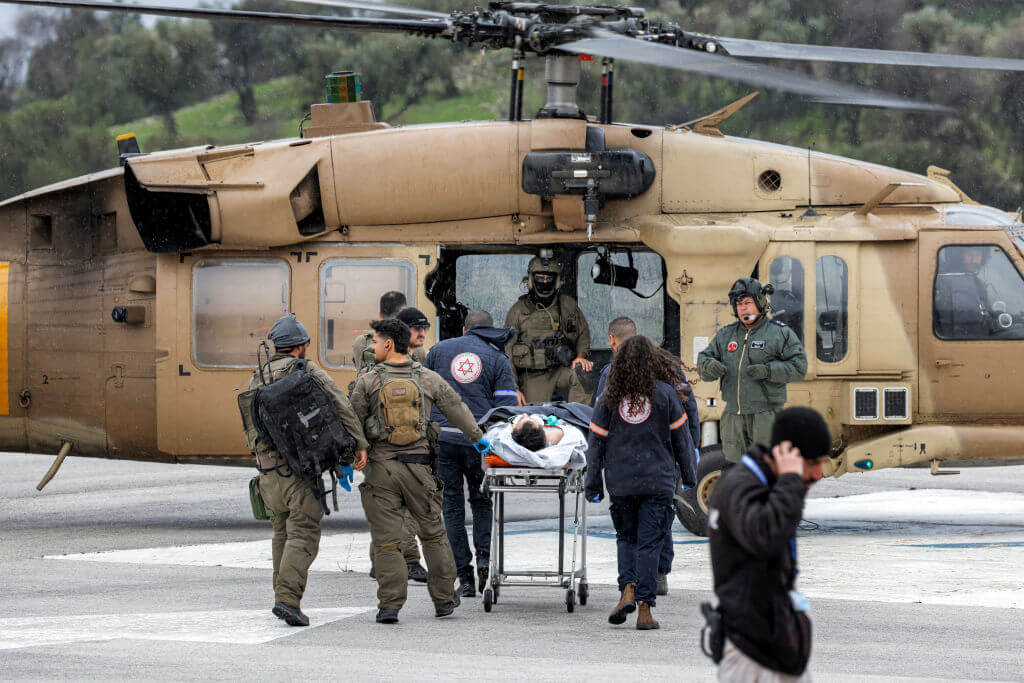Israel strikes in Lebanon after deadly rocket attack on Tzfat, ratcheting up tensions in north
The mayor of Tzfat rejected an evacuation of his city but called for the Israeli government to do more to protect it

An Israeli medical team transports a person wounded in a rocket attack fired from southern Lebanon in Israel’s northern city of Safed on February 14, 2024. Photo by Getty Images
(JTA) — Tensions are flaring at Israel’s northern border after a rocket fired from Lebanon killed a woman in the northern city of Tzfat.
Israel is reportedly carrying out extensive strikes inside southern Lebanon on Wednesday in response to the deadly rocket attack from Hezbollah, the Lebanese terror group, which also left eight Israelis wounded. Israel’s strike has reportedly killed four people.
The barrage comes as both countries are under pressure to deescalate tensions at the border, which has seen near-daily exchanges of fire since the outbreak of the Israel-Hamas war on Oct. 7.
Hezbollah says it will stop firing rockets only when Israel ceases that war, which began with Hamas’ deadly attack inside Israel on Oct. 7. The conflict in Israel’s north has led to calls from Israelis, including senior defense officials, to mount a major campaign against Hezbollah.
In Hezbollah’s last war with Israel, in 2006, more than 100 Israeli soldiers were killed in a ground invasion that did not end with a clear victor. In the 17 years since, Hezbollah has rebuilt its capacities for another round of conflict, against the terms of the treaty that ended that war. Now, a full-scale conflict with Hezbollah in Lebanon is widely understood to pose significant risk for Israelis across the country, especially in the north.
Many northern Israeli border communities were evacuated soon after Oct. 7 in the face of Hezbollah rocket fire, including the town of Kiryat Shemona. Two people were wounded there in a rocket attack this week.
The mayor of Tzfat, Shuki Ohana, also called Safed, said Wednesday that he would not evacuate his city despite the increased risk. He called on the government to provide more security for his city.
“There’s a shortage of defense in the city,” Ohana said.”The Israeli government needs to help with this issue. We have a dire shortage of defense.”
Tzfat, with a population of roughly 42,000, is home to a major military base and a hospital and is also a historic center of Jewish mysticism. Many of its residents are affiliated with the Chabad-Lubavitch movement of Hasidic Judaism, and they have remained in the past when hostilities have flared.
“Without a doubt the Torah protects us,” Rabbi Chaim Kaplan, who was injured by a rocket that fell in the city in 2006, told the Jewish Telegraphic Agency last month. He said his father had been the only one in his yeshiva not to heed a call to head to a bomb shelter when the city faced a barrage of rockets in 1978. “He said, ‘I am in my shelter: the yeshiva, learning Torah. Doing my mission is my bomb shelter. I will not leave for anything.’”
Kaplan filed a successful claim against Hezbollah in a U.S. court, which found that Iran and North Korea were liable for damages because of their support for the terror group.
This article originally appeared on JTA.org.
A message from our CEO & publisher Rachel Fishman Feddersen
I hope you appreciated this article. Before you go, I’d like to ask you to please support the Forward’s award-winning, nonprofit journalism during this critical time.
We’ve set a goal to raise $260,000 by December 31. That’s an ambitious goal, but one that will give us the resources we need to invest in the high quality news, opinion, analysis and cultural coverage that isn’t available anywhere else.
If you feel inspired to make an impact, now is the time to give something back. Join us as a member at your most generous level.
— Rachel Fishman Feddersen, Publisher and CEO